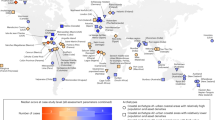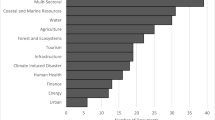Abstract
Conventional forecast driven approaches to climate change adaptation create a cascade of uncertainties that can overwhelm decision makers and delay proactive adaptation responses. Robust Decision Making inverts the analytical steps associated with forecast-led methodologies, reframing adaptation in the context of a specific decision maker’s capacities and vulnerabilities. In adopting this bottom-up approach, the aim is to determine adaptation solutions which are insensitive to uncertainty. Yet despite the increased use of the approach in large-scale adaptation projects in developed countries, there is little empirical evidence to test whether or not it can be successfully applied in developing countries. The complex realities of decision making processes, the need to combine quantitative data with qualitative understanding and competing environmental, socio-economic and political factors all pose significant obstacles to adaptation. In developing countries, these considerations are particularly relevant and additional pressures exist which may limit the uptake and utility of the Robust Decision Making approach. In this paper, we investigate the claim that the approach can be deemed valuable in developing countries. Challenges and opportunities associated with Robust Decision Making, as a heuristic decision framework, are discussed with insights from a case study of adapting coastal infrastructure to changing environmental risks in South Africa. Lessons are extracted about the ability of this framework to improve the handling of uncertainty in adaptation decisions in developing countries.



Similar content being viewed by others
Notes
Similar to a recent construction in Umhlanga, Durban: http://www.umhlangatourism.co.za/promenade.php.
References
Brown C (2011) Decision-scaling for robust planning and policy under climate uncertainty. World Resources Report Uncertainty Series. Available at http://www.worldresourcesreport.org/
Brundrit G (2008) Global climate change and adaptation: a sea-level rise risk assessment. Phase one: sea level rise model
Burns MER, Barwell L, Heinecken TJE (1993) Analysis of critical coastal processes affecting recreation and tourism development opportunities along the South-Western cape coastline. In: Wong PP (ed) Tourism vs. environment: the case of coastal areas, the geo journal library. Kluwer Academic Publishers, Boston, pp 19–32
Cape Times (2012) Municipal notices: invitation to tender. Published August 10. Tender No: 47C/2012/13: provision of professional services to model sediment dynamics in false bay and to provide recommendations for remedial options for the Glencairn railway line
Cartwright A (2008) Global climate change and adaptation. Phase three: final report, a sea-level rise risk assessment for the city of Cape Town
Cartwright A, Brundrit G, Fairhurst L (2008) Global climate change and adaptation. Phase four: final report, sea-level rise adaptation and risk mitigation measures for the city of Cape Town
Cash D, Clark W, Alcock F, Dickson N, Eckley N, Jger J (2002) Salience, credibility, legitimacy and boundaries: linking research, assessment and decision making. John F. Kennedy School of Government Harvard University Faculty Research Working Papers Series
Christensen JH et al (2007) Regional climate projections. In: Solomon S, Qin D, Manning M, Chen Z, Marquis M, Averyt KB, Tignor M, Miller HL (eds) Climate change 2007: the physical science basis. Contribution of working group i to the fourth assessment report of the intergovernmental panel on climate change. Cambridge University Press, Cambridge
City of Cape Town (2005) City of Cape Town’s coastal zone management strategy, coastal zone management review and state of the coast Year two: Nov 2004 - Oct 2005. Summary Report. Prepared by the Environmental Resource Management Department
Clark PU, Marshall McCabe A, Mix AC, Weaver AJ (2004) Rapid rise of sea level 19,000 years ago and its global implications. Science 304(5674):1141–1144
Colenbrander D, Sutherland C, Oelofse G, Gold H, Tsotsobe S (2012) Reducing the pathology of risk: developing an integrated municipal coastal protection zone for the City of Cape Town. In: Climate change at the city scale, Routledge, Earthscan, chap 10, pp 182–201
CSIR (1987) Glencairn Beach Management Plan. Tech. Rep. OX/C/CSW2/2
Dessai S, Wilby R (2011) How Can Developing Country Decision Makers Incorporate Uncertainty about Climate Risks into Existing Planning and Policymaking Processes? World Resources Report Uncertainty Series. Available at http://www.worldresourcesreport.org/
Hallegate S, Shah A, Lempert R, Brown C, Gill S (2012) Investment decision making under deep uncertainty: application to climate change. Policy Research Working Paper 6193, The World Bank, Sustainable Development Network, Office of the Chief Economist
Halsns K, Verhagen J (2007) Development based climate change adaptation and mitigation - conceptual issues and lessons learned in studies in developing countries. Mitig Adapt Strateg Glob Chang 12(5):665–684
Hulme M, Dessai S (2008) Predicting, deciding, learning: can one evaluate the ’success’ of national climate scenarios? Environ Res Lett 3:045,013
IPCC (2007) Climate change 2007: the physical science basis, contribution of working group i to the fourth assessment report of the intergovernmental panel on climate change. In: Solomon S, Qin D, Manning M, Chen Z, Marquis M, Averyt KB, Tignor M, Miller HL (eds). Cambridge University Press, Cambridge
IPCC (2013) Summary for Policymakers. In: Stocker TF, Qin D, Plattner G-K, Tignor M, Allen SK, Boschung J, Nauels A, Xia Y, Bex V, Midgley PM (eds) Climate change 2013: the physical science basis. Contribution of working group I to the fifth assessment report of the intergovernmental panel on climate change. Cambridge University Press, Cambridge
Johnson SR, Holt MT (1986) The value of climate information. Center for agricultural and rural development, Iowa State University. Staff Report 86-SR 6
Johnston P, Ziervogel G, Matthew M (2007) The uptake and usefulness of weather and climate forecast information among water resource managers in the SW Cape region of South Africa. Pap Appl Geogr Conf 30:380–389
Lempert R, Collins M (2007) Managing the risk of uncertain threshold responses: comparison of robust, optimum, and precautionary approaches. Risk Anal 27(4):1009–1026
Lempert R, Kalra N (2011) Managing climate risks in developing countries with robust decision making. World resources report uncertainty series. Available at http://www.worldresourcesreport.org/
Lempert R, Schlesinger M (2000) Robust strategies for abating climate change. Clim Chang 45:387–401
Lempert R, Nakicenovic N, Sarewitz D, Schlesinger M (2004) Characterising climate-change uncertainties for decision-makers. Clim Chang 65:1–9
Luseno WK, McPeak JG, Barrett CB, Little PD, Gebru G (2003) Assessing the value of climate forecast information for pastoralists: evidence from Southern Ethiopia and Northern Kenya. World Dev 31(9):1477–1494
Moss RH, Schneider SH (2004) Climate Scenarios and Projections: The known, the unknown, and the unknowable as applied to California. Prepared for the Aspen Global Change Institute by Susanne C. Moser
Mukheibir P, Ziervogel G (2007) Developing a municipal adaptation plan (MAP) for climate change: the City of Cape Town. Environ Urbanisation 19:143–158
New M, Hulme M (2000) Representing uncertainty in climate change scenarios: a Monte-Carlo approach. Integr Assess 1(3):203–213
Nicholls RJ, Marinova N, Lowe JA, Brown S, Vellinga P, de Gusmao D, Hinkel J, Tol RSJ (2011) Sea-level rise and its possible impacts given a ‘beyond 4 ∘C world’ in the twenty-first century. Phil Trans R Soc A 369(1934):161–181
NOAA (2012a) Global Sea Level Rise Scenarios for the United States National Climate Assessment. Technical Report OAR CPO-1, available at http://cpo.noaa.gov/sites/cpo/Reports/2012/NOAA_SLR_r3.pdf
NOAA (2012b) Tides and Currents: Sea Levels Online. Accessed 5 September 2012, available at http://tidesandcurrents.noaa.gov/sltrends/sltrends.shtml
Parson EA, Fisher-Vanden K (1997) Integrated assessment models of global climate change. Annu Rev Energy Environ 22:589–628
Parsons W (2013) Provision of professional services to model sediment dynamics in False Bay and to provide recommendations for the remedial options for the Glencairn railway line. Tech. Rep., 269990-00-CS-REP-0001
Rahmstorf S (2012) Modeling Sea Level Rise. Nat Educ Knowl 3(10):4
Rahmstorf S, Foster G, Cazenave A (2012) Comparing climate projections to observations up to 2011. Environ Res Lett 7(4):044035
Ranger N, Garbett-Shiels SL (2011) How can decision-makers in developing countries incorporate uncertainty about future climate risks into existing planning and policy-making processes? Policy paper. Centre for climate change economics and policy and the Grantham research institute on climate change and the environment in collaboration with the World Resources Report
Reeder T, Ranger N (2011) How do you adapt in an uncertain world? Lessons from the thames estuary 2100 project. World resources report uncertainty series. Available at http://www.worldresourcesreport.org/
Smit B, Wandel J (2006) Adaptation, adaptive capacity, and vulnerability. Global Environ Chang 16:282–292
Statistics South Africa (2013) Statistical release, P0302: Mid-year population estimates. Available at http://www.statssa.gov.za/publications/P0302/P03022013.pdf
Weaver CP, Lempert RJ, Brown C, Hall JA, Revell D, Sarewitz D (2013) Improving the contribution of climate model information to decision making: the value and demands of robust decision frameworks. WIREs Clim Chang 4:39–60
Weyant J et al (1996) Integrated assessment of climate change: an overview and comparison of approaches and results. In: Bruce JP, Lee HL, Haites E F (eds) Climate change 1995: economic and social dimensions of climate change, contribution of working group III to the second assessment report of the intergovernmental panel on climate change, Cambridge University Press, pp 367–396
Williamson RA, Hertzfeld HR, Cordes J (2002) The Socio-economic value of improved weather and climate information. Space policy institute, The George Washington University, Washington, DC 20052
Ziervogel G, Zermoglio F (2009) Climate change scenarios and the development of adaptation strategies in Africa: challenges and opportunities. Clim Res 40:133–146
Ziervogel G, Shale M, Du M (2010) Climate change adaptation in a developing country context: the case of urban water supply in Cape Town. Climat Dev 2:94–110
Acknowledgements
I would like to acknowledge the helpful cooperation of employees working at the City of Cape Town, particularly Darryl Colenbrander and consultants from Worley Parsons. Wind data for Roman Rock was provided by the South African Institute for Maritime Technology in Simon’s Town. I would also like to acknowledge the valuable input of colleagues at the University of Cape Town, namely Brendan Argent, Mark New, Hannah Beleta, Gina Ziervogel, Peter Johnston and Bruce Hewitson. I am especially grateful to the organizers of the CIRCLE-2 “Workshop on Uncertainty and Climate Change Adaptation” for providing a forum to share these findings. Finally, I would like to thank three anonymous reviewers whose comments and suggestions have helped to improve the manuscript.
Author information
Authors and Affiliations
Corresponding author
Additional information
This article is part of a Special Issue on “Uncertainty and Climate Change Adaptation” with Guest Editors Tiago Capela Lourenço, Ana Rovisco, Suraje Dessai, Richard Moss and Arthur Petersen.
Electronic supplementary material
Below is the link to the electronic supplementary material.
Rights and permissions
About this article
Cite this article
Daron, J. Challenges in using a Robust Decision Making approach to guide climate change adaptation in South Africa. Climatic Change 132, 459–473 (2015). https://doi.org/10.1007/s10584-014-1242-9
Received:
Accepted:
Published:
Issue Date:
DOI: https://doi.org/10.1007/s10584-014-1242-9




